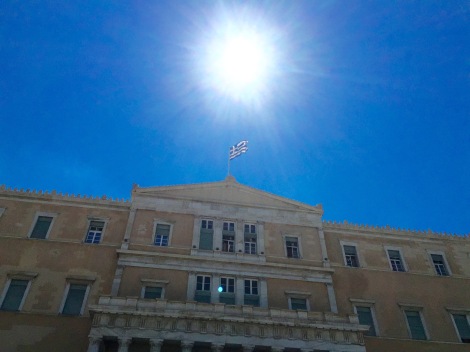In the surreal, wonderful world of summer holidays, I’m writing to you from Greece. In a whitewashed hotel room, with furniture painted in inimitable shades of Greek sea blue and green. The bed sheets are white and covered in the rough woolen blankets, which here retain a rustic beauty, but anywhere else would be described as ugly. We’re staying on the edge of the old town, not far from the port whose ferries ply the waters of the Cyclades. Tonight, there will inevitably be calamari and gyros and salad with feta and olives whose salty brine tastes of the perfect sea that surrounds us.
There you have it, the post card image of Greece. It is the perfect tourist cliché that, like all clichés, retains a truth. But Greece is nobodies’ darling at the moment. I understand the frustrations of both the international community who have been pushed to the limits of their patience waiting for reform and results, and the Greek populace, living under ineffective austerity measures. Capital controls have been in place for a week and the government has finally submitted their proposals for debt reform. By the start of next week, decisions will have been made. As the media is so fond of repeating, we are at crisis point.
But here, in the tourist bubble, it is barely evident. Tourists still scramble over the alabaster beauty of the Acropolis, and down into the cool shaded streets of the Plaka in search of ice-creams and ouzo served on ice. Apart from queues at ATMs, the only other evidence of the current crisis are the multitude of international journalists filming from the rooftop pool bars with the implacable stare of the Parthenon as their backdrop. And here on the islands, the beaches and lanes are still crowded with summer tourists, and I have been surprised to hear many Greek voices amongst them. The clichés of abundant hospitality are evident, and I am left to wonder whether it has always felt this helpful, this overtly welcoming, or if the current situation has made many business owners more grateful for our business. Practically, some businesses advertise VISA/Mastercard capabilities, some accept them as a matter of course, and some are insisting upon cash payments.
These cash payments are another of the clichés of Greece, along with tax evasion being the national sport, and accusations that Greece has, quite literally, been resting on her laurels for the last 2000 years. But as she inches closer to the most serious in a current stream of deadlines, can we imagine a European Union without Greece?
While she may not be the darling of Europe, surely she is the sentimental favourite. She gave us more than democracy and the Olympics. She gave us the fundamentals of the western ideologue in both rational thought and a sense of beauty in art and architecture. But in this modern world, it’s clearly not enough. After years of ineffective austerity measures, and a debt so large it is nauseating, it seems crunch time has come.
With my hair stiff with salt, sitting under a cloudless sky, a thought struck me: Greece suffers from an image problem of the most intractable kind. Think of all the reasons we love Greece: the languid summer, the late nights of delicious food, the marble dust washed from our feet in waters impossibly perfect, and an inescapable sense of stopping to savor life; all steeped in a history of the highest caliber. But when these are held in contrast to the mountainous debt, this image of Greece starts to feel irresponsible. Not quite fiddling while Rome burns, but certainly swimming.
Does our popular image of Greece count for her or against her?
Do we imagine her drinking ouzo under a bougainvillea-covered arbor while the debts pile up?
Do we imagine a European Union without its cultural cornerstone?
Were Greece a less glamorous country, less of a sentimental favourite, would I feel so inclined to forgive her?
As an outsider, it is difficult to reconcile. Up to this point, the stubborn stance of the government in the face of the phenomenal debt and government and banks literally running out of money, it seems incredibly arrogant. But years of frustrations over the austerity measures, culminating in the ‘Oxi’ vote are a last gasp at independence. From my conversations with taxi drivers and restaurant owners over the last few days, the mood here (in my albeit very unscientific study) is cautiously optimistic, with a feeling that Greece, along with Spain and Portugal, are needed for the euro.
The next few days will decide how much Europe needs, and wants, Greece to remain in the Euro zone. For all the culture Greece has given us; what is evident is that it is time for a change here, both on a fiscal level and a cultural level, however painful both of these may be. This change seems to be reflected in the latest proposals that include tax rises on shipping and scrapping of the tax discounts for the islands.
While Greece with always be part of our past, and though she will always remain geographically in Europe, I do hope she remains part of the Europeans Union’s future as well. I hope Europe can find a way for Greece to save herself, and she can show us all that she is more than the languid summer beauty and classical ruins of our post-cards.




